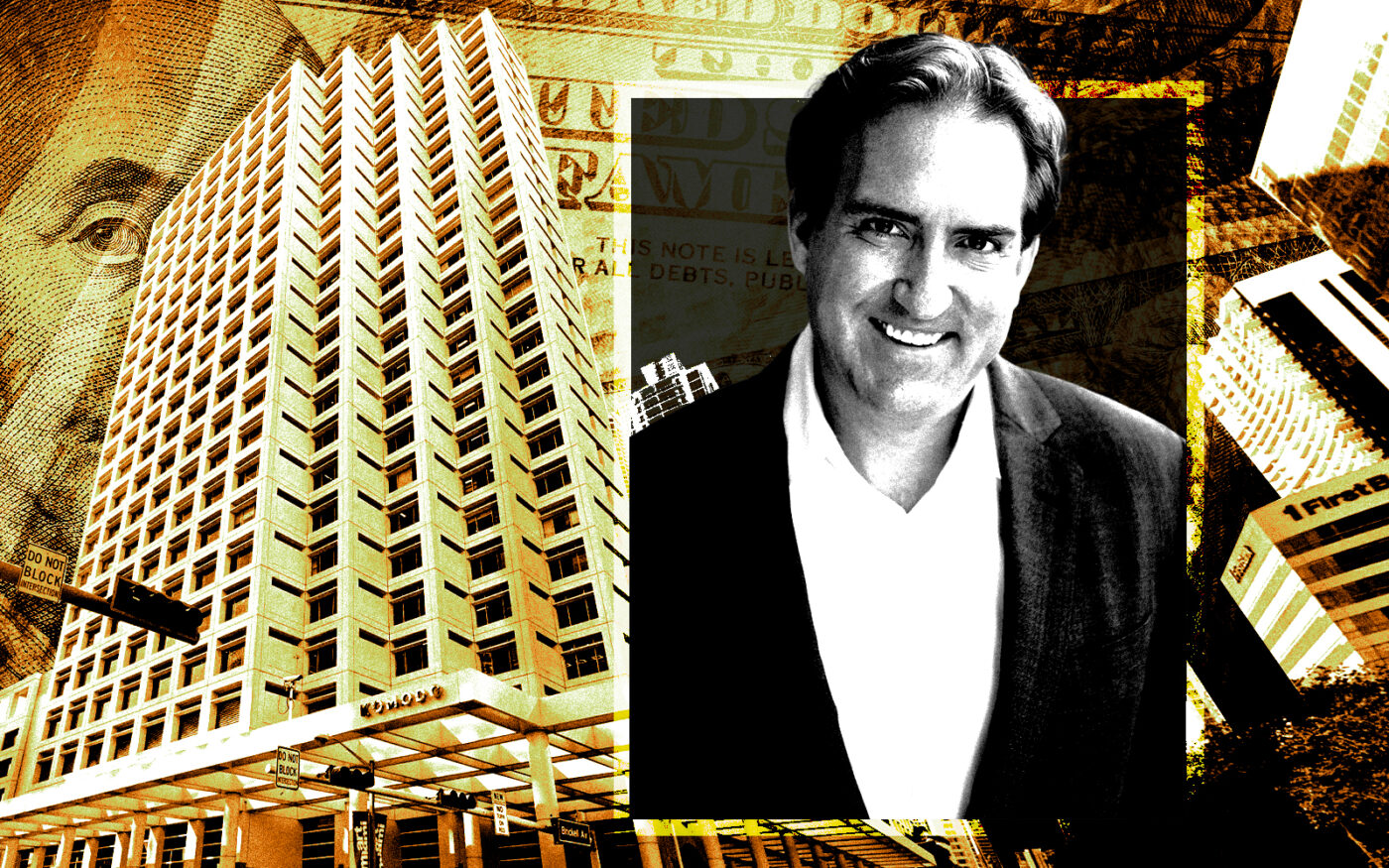Trending
Tourmaline’s CEO on investing in offices amid remote work, debt woes
“There's a lot of office buildings we would never own at any price,” Brandon Huffman says

A photo illustration of Tourmaline Capital Partners CEO Brandon Huffman and 801 Brickell Avenue (Getty, Tourmaline Capital Partners, Google Maps)
Many real estate players steered clear of the office market during the past three years. Remote work and a difficult lending climate led to leasing and debt woes across the U.S., cooling investment appetite.
Yet, in 2021, amid abounding uncertainty over the future of workspace, Tourmaline Capital Partners formed, aiming to target an unlikely asset class: offices.
The Bryn Mawr, Pennsylvania-based firm has amassed a portfolio of eight properties, mostly in the Sun Belt, spanning 4.5 million square feet, as well as two development sites. This includes ownership stakes in the Apex at Legacy campus, with 20-story and 14-story buildings, in Plano, Texas; the 40-story One South tower in Uptown Charlotte, North Carolina; and the 1 million-plus-square-foot Esplanade mixed-use office campus in Phoenix, Arizona. The firm’s only campus outside the Sun Belt is the 366,000-square-foot, three-property Steelman Collective in Minneapolis’ North Loop neighborhood.
In South Florida, Tourmaline owns a stake in the 34-story Citigroup Center tower in downtown Miami and the 28-story 801 Brickell building in the city’s financial district.
Tourmaline is not betting on an across-the-board rebound of offices, CEO Brandon Huffman said.
“There’s a lot of office buildings we would never own at any price.… The bottom 30 percent of the office stock, I wouldn’t pay anything for,” he said. “We think a lot of offices will languish in the middle. And then, a lot of offices at the very top of the market have the potential to do really, really well.”
Huffman co-founded Tourmaline with Jeffrey Fronek and Jonathan Jacobs. While the three worked as executives at Philadelphia-based office real estate investment adviser and fund manager Rubenstein Partners, they noticed a shift in the way employees wanted to work, even before March 2020.
“When the pandemic set in, we thought that could potentially serve as a catalyst to accelerate these trends. We thought the sector was going to evolve very, very quickly in some meaningful ways,” Huffman said. “Our view was that with uncertainty comes opportunity. That was as good a time as any to capitalize on the dislocation happening within the category.”
So what exactly is the type of office property Tourmaline bets will “do really, really well”? Who are the firm’s investment partners? Where will Brickell’s record office rents go next? And how did the founders come up with the name “Tourmaline”?
Huffman sat down with The Real Deal to answer these and other questions.
This interview has been edited and condensed for clarity.
Q. Tell us about Tourmaline’s business model. What types of offices is it investing in, and how is it renovating its campuses to make them relevant to today’s demands?
A. People always talk about the clichéd “flight to quality.”
But that’s meant different things over the years. People used to think quality was just a couple of nice amenities within four walls. But that’s a check-the-box amenities type of thing, and we didn’t really think that’s what tenants want. They want something a lot more than that. Much more hospitality with many more services, more robust services that aren’t necessarily within the four walls of a building, but factored in throughout a campus.
What Covid really taught us is not that people like working from home, but they want a variety of postures throughout the work week. They want to have that place where they can work, which can be outside of the gym after they work out, or it can be the coffee shop. We wanted to incorporate as much of that as possible within our campuses, as opposed to people having to go outside of the campus to access a lot of those spaces.
Q. It seems that you are describing the difference between working in an office building that’s marketed as “highly amenitized” because it has a gym and a café, versus working in a city downtown, where it’s a more organic collection of what employees want –– restaurants, gyms, collaborative spaces, podcast recording studios and a walkable environment, with the latter what Tourmaline is recreating at its properties?
A. That’s exactly it. It’s become more and more clear over time that that’s the optimal way most people want to work. But it’s hard to do that well, unless you really control the real estate and have your finger on the pulse of the consumer.
We ourselves are a consumer. We’re a young team, we know how we like to work. And I think it’s very different from the way people worked in office buildings, certainly 20 years ago, or even five years ago.
Q. Tell me about the office market trends that were budding pre-pandemic that you, Fronek and Jacobs thought would accelerate in the following years?
A. One of them was just the migration pattern. The reality is that there’s been a shift to the Sun Belt for 30 or 40 years. People have been moving to Florida and Texas more than they have to Chicago or Philadelphia.
We thought there was a chance that Covid would accelerate that, and it obviously did. The jobs have followed. That doesn’t mean we will exclusively focus on those markets. There are really exciting pockets of strength. As you know, we’ve done a deal in Minneapolis, which is Steelman Collective.
Q. Tourmaline co-owns the majority, if not all, of its properties with Monarch Alternative Capital, which has offices in New York, London and West Palm Beach. What is the relationship between the firms?
A.Monarch is one of our largest investment partners. We are very closely associated with it.
When we started, we were exploring different relationships. We did have some close connections to a number of the executives of Monarch. It is a big real estate player, and it does a lot in the private markets. But it puts on a lot of those trades in conjunction with dedicated specialists of all the major categories. So it’s looking for domain experts, to help them identify opportunities, run them, renovate them, so on, and so forth. To that end, we have become Monarch’s office group to do that on its behalf when it invests. [Editor’s note: After publication of this report, a Tourmaline spokesperson said this description of the relationship between Tourmaline and Monarch isn’t entirely accurate and provided the following clarification statement: “We [Tourmaline] have been working and collaborating with Monarch since day one, effectively they put us in business, and they continue to be instrumental in driving decision making, strategy and vision for the product.”]
Q. Who are Tourmaline’s other investors?
A. We have family offices as partners and smaller private equity groups. Their names wouldn’t necessarily ring a bell to anyone because they are not necessarily household names.
They rely on us to find these opportunities and invest alongside us.
Q. How does Tourmaline structure its deals — only using equity from investors? Or does it take out financing?
A. Most of our investors, like most real estate investors, are leveraged buyers employing some form of debt. Obviously, every situation is different.
But as a buyer, we are somewhat mathematically indifferent whether we get debt from a third party at historically expensive pricing and probably historically conservative leverage, or get it from the seller. If we’re getting way better terms than market financing from a lender [on the seller side,] or a seller to help prop up the purchase price, we can just do the calculation and obviously pay a little bit more for that asset, versus getting third-party debt that would be much more expensive. We are going to just do the math and solve for effectively the same returns.
A lot of the financing is driven by what the seller wants to achieve. If they want to maximize the purchase price, then they’ll stay in the deal by taking back a note. We’re fine with that. If they want to get out entirely from a property, we just pay a lower price using more expensive third-party debt. We’re also fine with that.
Q. What were the discussions like at Tourmaline when the Federal Reserve started raising interest rates in March of last year?
A. Any asset under the sun is not immune from an interest rate movement, particularly when rates slip up so sharply. For us, it creates a lot of opportunities. For offices, there’s not really an opportunity to extend loans like in multifamily, retail and industrial. Offices are a more capital-intensive business, where you often have to continuously reinvest in these assets to maintain their value.
For the first 12 to 15 or 18 months after the major hikes, nothing happened because everybody was kind of frozen. A lot of the sellers were looking at yesterday’s pricing, the buyers were looking at tomorrow’s pricing, and there was a huge bid-ask spread, which is why you saw so few transactions for the last year and a half. Now, though, I think that’s starting to really move, and products that are going to be trading in the next one to three years, it’s going to be lender-driven on many of these processes. It’s become obvious to us that a lot of the office assets, really good assets, will be in play sooner than later.
Q. Tell me about Tourmaline’s plans for its development sites?
A. They are in Dallas and Nashville. In Nashville, the plan is for a multimillion-square-foot mixed-use complex that will be built out over a number of years. (Preliminary plans are for buildings rising from 26 stories to 32 stories and nearly 911,000 square feet of real estate total in the city’s Midtown, according to Tourmaline’s website.)
But our development pipeline doesn’t mean we’re building at this moment in time. We haven’t broken ground. They’re really good sites we control that will eventually be developed.
Q. Tourmaline and Monarch’s $250 million purchase of 801 Brickell in October marked South Florida’s biggest office deal this year. But the influx of out-of-state companies to the tri-county region has slowed compared to late 2020 to early last year. Where do you see things going in South Florida, including with record office rents on Brickell at over $100 per square foot?
A. Florida is becoming much more of a global mecca. Back in the day, we used to worry whether Florida really had the critical mass and the ecosystem to support a lot of companies that wanted to go there.
Clearly, now it does. The ecosystem will start growing on itself, given how attractive the business climate is. So perhaps on the margin, we over-allocate resources there to find opportunities, though we really focus on the entire country and what’s really going to be the top product. It could be South Florida or L.A.
Part of the reason things have slowed in South Florida on the absorption side is that there’s just not nearly as much space to absorb anymore. You’re not going to have the same absorption numbers from two years ago because it’s impossible. You have to be building.
As for the rents, we don’t see a huge correction happening. We think there will continue to be demand, as a percentage of the overall user base, that will increasingly be able to pay these higher rents.
Q. Why “Tourmaline”?
A. When you start a company, you’re doing so many things that the name almost becomes an afterthought.
Some of our partners are from San Diego, and there’s a great surf beach there called Tourmaline. Tourmaline is also a stone that promotes balance, and sort of like this concept of yin and yang. So it has this connotation related to sound investment principles.




